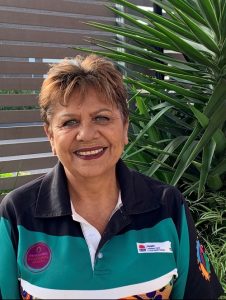

Debbie Beahan
Deb is a proud Wiradjuri woman who grew up in the small community of Albert in Central West NSW. She has worked for the Western NSW Local Health District for 42 years starting her career as an Enrolled Nurse and Aboriginal Health Practitioner. Deb has a background of chronic disease management specialising in Diabetes and promoting healthy lifestyles. Deb is actively involved in the Indigenous community through programs she coordinates such as the Wellness Exercise Program, Marang Dhali Cooking Program, Wellbeing Koori Yarning Group, Elders Clinic and Chronic Care Support Group .
Abstract
Title: “Keeping the mob in mind” – integrating care across western NSW for aboriginal people
Author(s): Leanne Stimpson, Deb Beahan
Introduction: Aboriginal people living in Western NSW have a significant higher incidence of chronic illness and ill mental health which impacts social and emotional wellbeing. Aboriginal people are less likely to access mainstream health services until much later in the disease process and more likely to leave hospital early or not attend.
The Planned Care for Better Health program (PCBH) and Emergency Department to Community (EDC) are key integrated care programs that address managing complex physical health, mental health and social needs in the individual’s communities with kin and on country. The programs work on the understanding that ill physical health is often accompanied by ill mental health and vice versa, and that treatments and lifestyle risks for those living with ill mental health increase the risk of chronic disease.
Method:The Aboriginal Wellbeing Coordinator (PCBH) and Aboriginal Mental Health Clinician (community mental health, EDC) have been crucial in delivering care to Aboriginal people accessing these programs in Dubbo.
These health professionals utilise skills to engage, holistically assess and coordinate care for Aboriginal people living with complex care needs. Having a yarn to improve health literacy and making connections with community and running healthy lifestyle sessions increase understanding on how to manage conditions concurrently at home. They provide a safe space for Aboriginal people to tell their story and be provided culturally safe navigation to appropriate services.
Results & Findings: Enrolment rates for Aboriginal people in the programs have tripled in a 12 month period in Dubbo and surrounds. Through integrating both physical and mental health care, provides collaboration across multiple services to ensure a culturally appropriate lens is applied at the individual and supports, service and system level.
Discussion:The two roles have enhanced the Aboriginal communities living in Dubbo and surrounds’ physical, social, emotional, environmental and spiritual wellbeing through connection, empowerment and culture.